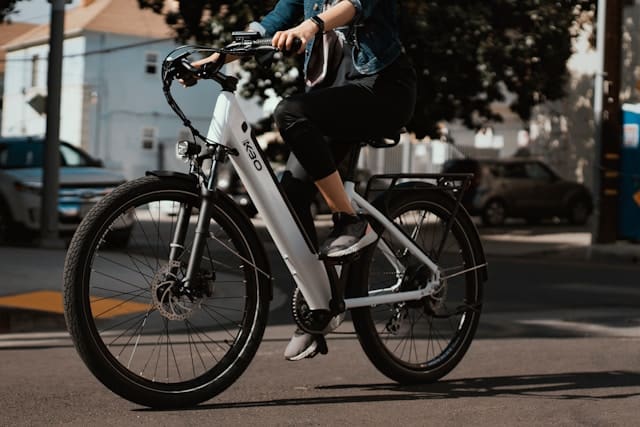As environmental concerns continue to grow, more and more people and communities are looking for ways to reduce their carbon footprint and dependence on fossil fuels. With this in mind, ebikes have become a great option for those looking for a convenient and environmentally friendly way to get around and explore. In this article, we’ll take a closer look at ebikes and their environmental impact. We’ll also examine their benefits and how they can contribute to sustainable mobility.
Ebikes Offer a Greener Alternative to Traditional Vehicles
Using the power of ebikes for sale, you can reduce your dependency on fossil fuels while reducing harmful emissions. Unlike traditional cars, ebikes run clean and emit no tailpipe emissions. Not only does this improve air quality, but it also helps fight climate change by decreasing the carbon footprint of transportation. Besides reducing emissions, ebikes have other environmental benefits as well. They have fewer moving parts than internal combustion engines and require less maintenance than other types of vehicles. By adopting ebikes for sale as a sustainable travel method, you can help build a greener future for future generations.
Preserving Natural Resources: The Efficiency of Ebike Technology
Ebikes are not only eco-friendly, but they are also resource-efficient. Unlike conventional vehicles, which consume much energy through combustion, ebikes use electric motors, which are inherently more energy efficient. The higher efficiency of the electric motor means that more energy is transferred to the battery, reducing energy waste and maximising the bike’s range. Additionally, many ebikes have regenerative braking, which means that energy is captured and stored at the time of braking, increasing the bike’s efficiency. Finally, ebikes can be powered by renewable energy sources like solar or wind, reducing reliance on fossil fuels and improving the sustainability of the energy system. All in all, ebikes are a key part of the shift towards a more sustainable and energy-efficient transportation system.
Reducing Traffic Congestion: Ebikes as a Solution for Urban Mobility
Traffic congestion is one of the biggest problems in urban areas, leading to air pollution, long commutes, and a lower quality of life overall. Ebikes offer a great solution to this problem, as they are more efficient and flexible than cars. Cars take up a lot of road space and contribute to traffic gridlock. Ebikes, conversely, can navigate through traffic easily, taking advantage of bike lanes, roads, and other routes that larger vehicles can’t use. Not only does this flexibility reduce individual commute times, but it also reduces overall congestion, as multiple ebikes can take up a single car’s space. In addition, ebikes promote better co-habitation between cyclists and walkers, creating a safer and healthier urban environment for everyone. By embracing ebike as a viable form of transportation, cities can reduce the negative effects of traffic congestion and improve air quality and overall liability in urban spaces.
Promoting Active Transportation: Health Benefits and Environmental Gains
Not only do ebikes help the environment, but they also encourage active transportation and a healthier lifestyle. By encouraging people to cycle instead of driving, ebikes promote more physical activity and reduce sedentary behaviour, resulting in better health outcomes and lower healthcare costs. Furthermore, research shows that ebike riders tend to stick to their cycling habits longer than traditional cyclists. This suggests that ebikes may be a sustainable solution for encouraging regular exercise and an active lifestyle. Ebikes also offer accessibility benefits. Ebikes are accessible to everyone, regardless of fitness level or physical ability. This inclusiveness promotes social equity and allows more people to take advantage of sustainable transportation options, resulting in healthier populations and a cleaner environment.
Investing in Sustainable Infrastructure: The Future of Ebike Transportation
As ebike adoption continues to grow, cities and communities worldwide are investing in sustainable infrastructure specifically designed to support this trend. This includes more dedicated bike lanes, integrated bike-sharing programs, and strategically placed charging stations designed to support electric vehicles, including ebike. These initiatives make it easier for ebike riders to incorporate into existing urban landscapes and incentivise ebike adoption by providing critical support systems for ebike riders. By focusing on sustainable infrastructure, policymakers and city planners not only encourage the widespread adoption of ebike, but also promote a culture of ebike-friendly commuting, resulting in significant emissions reductions and a significant step forward in our collective journey towards environmental sustainability.
Embracing a Sustainable Future with Ebikes
Ebikes provide a sustainable and environmentally friendly solution to the challenges of traditional modes of transport. They reduce emissions, conserve resources, and encourage active transportation, all of which contribute to sustainable mobility and a cleaner, healthier society. As we continue to focus on environmental sustainability, investments in ebike and sustainable infrastructure will play an important role in advancing a greener, more sustainable future.
About the Author/s
The New Jersey Digest is a new jersey magazine that has chronicled daily life in the Garden State for over 10 years.
